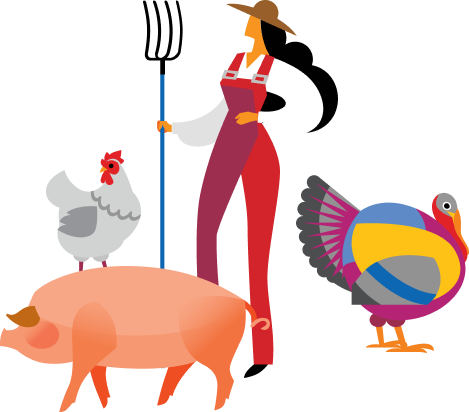Commitments
We uphold our commitment through the collective engagement of everyone involved.
BRF Sustainability Plan
In line with the Sustainability Policy, in 2020 we also launched the BRF Sustainability Plan, which has 22 commitments to increase our transparency and reinforce 5 ambitions by 2030:
1. Act in synergy with our partners and positively impact the communities
2. Innovate and achieve sustainable solutions for global challenges
3. Promote animal welfare
4. Be inclusive, plural and diverse
5. Preserve the environment and be eco-efficient
We have established crosscutting commitments to ESG aspects, connected with BRF's 2030 Vision. Our work focuses on topics such as diversity, combating waste and climate change, efficient management of natural resources, animal welfare and social investment.
BRF has strived to avoid routine mutilations and eliminate, as far as possible, these practices. We already have a commitment not to cut beaks in broiler chickens, not to cut ears and teeth in pigs, not to cut wings in egg-producing chickens and not cut of the tail in cattle. All surgical intervention should only be done to avoid pain and suffering to animals, as is the case of tail cutting in pigs.

Public goals
Main Animal Welfare Guidelines:
1. The main animal welfare guidelines are established in the updated document, demonstrating the company's commitment at all levels to animal welfare:
2. Ensure the non-use of antibiotics as growth promoters in the animal farming chain.
Since 2019, BRF has not used antibiotics for the purpose of promoting animal growth.
3. Implement environmental enrichment in 100% of broiler chicken and pig farming operations by 2025.
The turkey supply chain has had 100% environmental enrichment in its facilities since 2021. We have made progress in meeting this target in the chicken (23.9%) and pig (41%) supply chains, and we are developing new tools to fulfill this commitment.
4. Certify 100% of production facilities in animal welfare by 2025.
The turkey supply chain has had 100% environmental enrichment in its facilities since 2021. We have made progress in meeting this indicator in the chicken (23.9%) and pig (41%) supply chains, and we are developing new tools to fulfill this commitment.
1. Use only cage-free eggs globally by 2025.
In Brazil, this commitment has been fully met since 2020. In 2024, we focused on developing suppliers to meet this commitment in international markets.
2. Ensure that 100% of birds in the global integration system are cage-free by 2023.
Since 2023, all birds in the integration system in Brazil and Turkey have been raised cage-free.
1. Implement 100% group housing for sow gestation by 2026. Starting in 2023, all new housing projects for sows will follow the “crate-free and loose-housed” model.
Despite economic challenges, we have made progress in meeting this target, especially in the southern region of the country.
-
By 201515% executed
-
Até 2016 to 201829% executed
In 2016, adjustments to the collective gestation system benefited 20,950 breeding sows, totaling, since 2015, 103,000 breeding sows in collective gestation crates, accounting for 20% of the BRF nursery beds.
2016 was a tough year for the Brazilian economic scenario, which retracted funding sources for these activities, considering that BRF purchased nursery beds that were not in line with the system recommended by the company.
-
201935% executed
We have met the goal for 2019 and have 35% of our stock of breeding sows in a group housing system for pregnant sows. This means more than 140,000 sows in suitable facilities, in line with the best animal welfare guidelines.
-
202045% executed
WWe exceeded the proposed target for 2020 (expected to be 40%) and we have 45% of the sows in the collective gestation system. This means more than 180,000 females in adequate facilities according to the best practicies of animal welfare, being able to exercise their natural behavior of socialization among individuals and move freely in the facility.
-
202355,9% goal
In 2023, we adapted 100% of the housing for sow to the group gestation system at the Concórdia unit (SC).
We have about 5% of females housed in the pre implentation model.
-
2026100% goal
Improving more and more our practices, we try to realize the possible minimum of physical changes in the animals and for this we commit ourselves:
2. Ensure that 100% of pigs raised by BRF are not identified through mutilation by 2021.
Since 2021, we have met this commitment by using ear tags and tattoos across BRF’s entire global pig population.
3. Ensure that 100% of pigs raised by BRF do not undergo teeth clipping or grinding by 2021.*
This procedure is carried out only as an exception, when the welfare of the sows is at risk.*
4. Ensure that 100% of male pigs are not surgically castrated by 2022.**
In 2022, the castration method for male pigs was changed to immunocastration. When surgical castration is necessary, it is performed under anesthesia.*
5. Ensure the use of analgesia in 100% of pig tail docking procedures by 2025.
In 2024, we conducted validation tests on potential products to meet this commitment.
6. Zero tolerance for animal mistreatment, whether due to abuse or negligence.
Since 2020, BRF has maintained a commitment to zero tolerance for animal mistreatment. All operations are monitored, and in cases of suspected non-compliance, investigations are conducted and the consequence policy is enforced when violations are confirmed.
* Pigs are identified by a numbering that guarantees the traceability of the animals.
** In extreme cases (when the welfare of the animals is compromised) the practice will be admitted. The commitments are in line with the practices promoted by the 3T's group and the 4Rs concept.
*** Guarantee that when surgical castration is necessary for the production of specific products, it must be performed with the use of analgesics and anesthesia.
The commitments go against the 3T's practices and the 4Rs concept:
- Reduce: Reduce the number of physical changes
- Refine: Refine/Optimize processes
- Replace: Replace practices
- Responsibility: Responsibility for animal management practices
